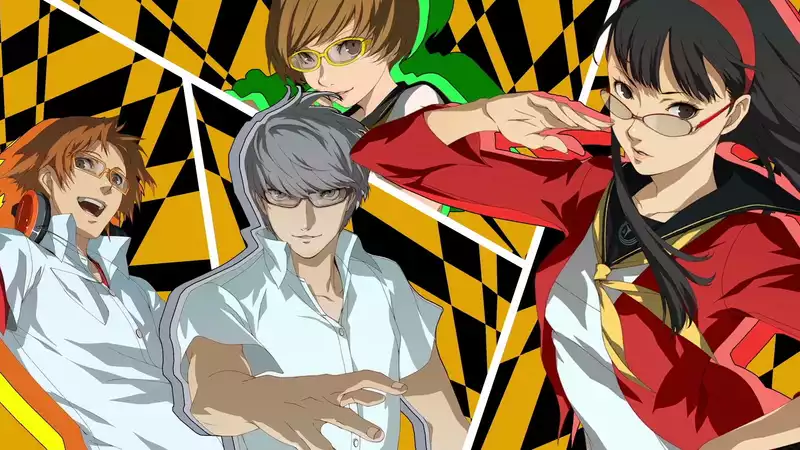Starting a new school is tough for anyone. But it's especially tough for the teenage protagonist of Atlas' sprawling JRPG. Having moved from the hustle and bustle and bright lights of Tokyo to the supposed calm of rural Inaba, he has just unpacked his bags when a gruesome series of murders occur in this sleepy town. With his detective uncle rarely home, he uses his spare time to unite with his classmates, each with latent psychic powers, to investigate this disturbing phenomenon. While navigating a fantastical dungeon filled with strange monsters while being stuck in the pitfalls of adolescent school life sounds like an odd combination, the genius of "Persona 4 Golden" lies in how brilliantly it intertwines these two seemingly disparate ideas
Still, it is a very interesting and interesting idea.
Still, first impressions are not particularly promising. After all, this is a port of a port. It is based on an eight-year-old PS Vita version, which itself was a refinement of the PS2 version released in 2008. As such, it feels visually dated, although the stylish and evocative art design makes up for its technical shortcomings. It's also still a slow starter, and while Golden simplifies the original's notoriously dour introduction, it still takes a couple of hours before the wheels come off and you're in full control of your own schedule. It takes a little patience to figure out what it is that makes this game so special.
Eventually, you will be able to decide for yourself what to do outside of school hours. Will they stop by the music room for band practice or head to the field for soccer practice? Will you meet up with the brusque but pleasant Yosuke, or hang out with the friendly, steak-loving Chie?
The game occasionally invites you to lessons, and answering selective questions (sometimes to help a friend who doesn't know or isn't paying attention) will boost your character's social qualities a bit. With a higher "knowledge" status, the character can pass the exam or work part-time as a translator to earn some extra money. On the other hand, completing a spicy meal at a Chinese restaurant will raise the "Courage" status and eventually give the character the courage to make a late-night visit to a local shrine that is rumored to be haunted.
They can also increase their social links to bond with school friends. This unlocks additional dialogue options, but more importantly, it leads to the other half of the game. Each time one of your classmates disappears, you must prepare to save them before they are gone forever. Each time you attempt a rescue, you step into a world of shadows that can be accessed through the TV, a sort of "RINGO" in reverse. Here, you will explore the rooms and hallways of a mansion that has many floors and attack the shadows that patrol it.
You can attack with weapons made by the local blacksmith, but you can also summon personas to do more damage. Over time, you collect dozens of personas and gain the ability to fuse two or more together to create a more powerful and versatile persona. Personas can inherit existing abilities as they are, or they can learn even more diverse skills with skill cards.
The turn-based combat, while not particularly innovative, is lively and engaging. The main character, Chloe, is directly controlled, while the other party members act independently, but can be guided by giving them predetermined tactics. Aim at their weakest element and you can fire another shot, or encourage a fallen enemy to pile on the party (amusingly, they rush forward and disappear in a traditional cartoon battle cloud). When a friend reaches out and picks you up off the floor, you remember the times you spent on the rooftop after school talking nonsense and eating beef bowls at night.
The victim's persona is also a reminder of the struggles they have overcome. Each victim's dungeon represents an inner prison of their own making, where their darkest or most secretive thoughts and impulses manifest as a dangerous shadowy presence. By saving each victim, you not only accept their flaws, but you empower them to welcome them into your heart. Thus individual personas are born, giving each a mask to overcome their tribulations.
All of this gives depth and nuance to the characterization, avoiding the hero archetypes so common in JRPGs. Although the game deals with dark subject matter, it is not without moments of humor, and just when you think you have settled into a familiar rhythm, you find a break from the routine that shakes things up. It may be irritating at first when young cousin Nanako parrots the advertising claims of the local department store, Jeunesse. But as she sits alone in front of the TV every night and sighs as she delivers the news that her father will be late for work again, this cheerful refrain takes on a tinge of sadness.
At about 60 hours long, it takes a while to get to the bottom of what is going on, but the one-cour structure keeps "Persona 4 Golden" from dragging on. As you open up to this small town and its inhabitants, you will enjoy your time in Inaba more and more, and you will quickly become accustomed to its flavorful loops. Despite its fantastical elements, "Persona 4 the Golden" presents the difficulties, anguish, and embarrassment of adolescence in a piercingly truthful way. It may be a bit dated, but the belated arrival on PC of one of the best of the modern JRPGs is most welcome.
.

Comments